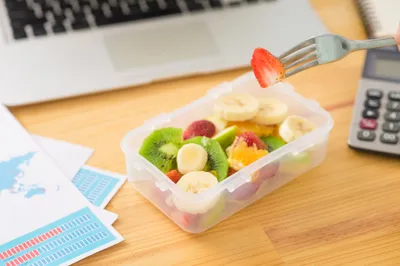There is a convincing case to be made that you can throw all the trendy diets out the window and eat whatever you want as long as you refrain from doing one very simple thing: overeating. It’s a pretty simple concept, really. If you reduce your caloric intake, you will not gain as much weight. If you reduce your caloric intake to the point where you are burning more energy than you are consuming, you will then lose weight. Nutrition is really not the rocket science that many make it out to be. The problem is, though, how do you stop yourself from overeating, especially once it’s become an ingrained habit?
1. Stop Eating Before You’re Stuffed
Your stomach will tell you when it is full. The trick is to hear what your stomach is telling you and then put down the fork, regardless of how good the rest of that casserole looks. Here is a good trick. Try to have an internal conversation with yourself while eating. Ask yourself throughout the meal, “Am I still hungry?” Are you slightly less hungry than you were before the meal began? Then keep eating and check back in a couple of bites.
Eventually, at some point during every meal, that feeling of hunger that drove you to consume food will dissipate. If you keep checking with yourself to pinpoint exactly when that feeling is gone, you will figure out when you are full and be able to stop eating when you should. Remember, the meal does not have to continue until all the food in front of you is gone. That’s the mistake that millions of overweight people make.
2. Chew. And Then Chew Some More.
Chewing, and even over chewing, is a good way to slow down your eating, which makes it easier to recognize you are full so you know when to stop eating. Researchers at the University of Florida claim that it takes 20-minutes for signals related to food satisfaction to reach to the brain of an obese person. By slowing down the intake of food, you are allowing those signals time to do their job. Chewing thoroughly each and every single bite is buying your body the time it needs to understand how much more food is needed.
Chewing in general is also beneficial for your digestive system as a whole. It is the first step in the digestive process and failing to chew enough might prevent you from absorbing all of the nutrients from the food you are consuming. This in turn may trick your digestive system into thinking it needs to consume more food than it actually does. So chewing properly will go a long way to stop you from overeating.
3. Drink Water with Your Meals
Drinking water with your meals, as opposed to soft drinks, alcohol, or other caloric liquids, is a no brainer on numerous levels. While drinking water obviously alleviates dehydration, it can also play a crucial role in preventing you from overrating. Here is how. First of all, water has zero calories, therefore drinking it in place of a sweetened ice tea will reduce caloric intake.
You can’t forget about the liquids you consume when it comes to overeating, they can add up too. Drinking water over everything else is an easy way to eliminate this problem. Additionally, you can use water as a means to help pace yourself throughout the meal. Some people take sips in between bites or a couple of sips after they finish a specific part of the meal. However you go about it, using water in such a manner helps you space out your food intake while also aiding in the digestive process (something that basically no other liquid does).
4. Eat Regularly
Let’s face it. When are you most likely to overeat? When you are absolutely starving, of course. How do you prevent yourself from getting hungry to the point that the next opportunity you have to eat turns into a binge? Eating at regular intervals throughout the day to prevent these types of situations is a good start.
A study published in the International Journal of Obesity demonstrates how keeping hunger at bay reduces the amount of food you will ultimately consume. Here is what they found. Five small meals were given to one group of overweight men who were then able to choose a sixth meal. A second group ate only a single meal that contained the same number of calories as the 5 meals that the first group ate. The second group was then allowed to choose a second meal also. What the study found was that the 6-meal men chose to eat 27-percent less food at their last meal than the two-meal men did. Seems like a pretty good incentive to eat regularly.
5. Get New Dinnerware
Probably the most direct way to prevent overeating is to mind the size of your portions. It can be difficult figuring out what the perfect size portion is that will fill you up though. A good trick is to use smaller plates. There is less room on a smaller plate for food, but visually, when that plate is full, you’ll trick yourself into thinking you are helping yourself to a nice big serving. Restaurants have been doing this for decades by utilizing different plates for lunch and dinner service. Lunch menus, often the same as dinner menus, but with smaller and cheaper portions, come on smaller plates so as to visually satisfy their hungry lunch crowd.
The color of your dinnerware is also important. Research suggests that when there is a low contrast between the color of the food and the color of the plates people tend to eat more. According to a study done by the Journal of Consumer Research, preparing fettuccini Alfredo and serving it on a white dish leads to eating 22-percent more of it than if it had been served on a black dish.
6. Turn the TV Off
It is impossible to do things like slowing down your eating by actively chewing and sipping water in between bites when you are mesmerized by the TV screen. And forget about hearing the message that your stomach is sending you about being full. A 2013 study published in the American Journal of Clinical Nutrition demonstrates that TV distracts people while they eat and usually leads to them eating more of the same meal than they would if they weren’t watching TV. And you could be even worse off if you tend to watch action-packed TV shows instead of the news or sitcoms, according to a 2014 Cornell University study.
Apparently, the action shows caused people to consume a significantly higher percentage of food than other less dramatic shows, even if the sound was off! Regardless of what you like to watch on TV, don’t watch it during mealtime. Eat your meal at the table and pay attention to what you are doing so that you can ensure you’re not overeating.









